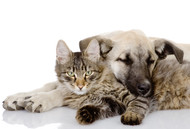Puppy & Kitten Development
Posted by Darren Walton on 8th Sep 2022
It is essential for any owner to be aware of how best to support the rapid changes which puppies and kittens go through in the early stages of their lives. Development from a blind, defenceless neonate through to a fully grown adult can take as little as one year. During this short time significant cognitive, behavioural and physical changes occur and these need to be understood to ensure puppies and kittens develop into well adjusted, happy and healthy adults.
During the first two weeks following birth puppies or kittens are fully dependent on mum, their main sensory input at this stage is smell and touch. They will not be able to see, hear or urinate or defecate without mum’s help. Generally they will spend 90% of each day sleeping. During this time it is important that puppies and kittens are kept warm, this can be achieved using a heat lamp, heated pet pad or similar. Vetbed is ideal for keeping puppies and kittens warm and dry as any moisture simply drains through, leaving the fibres fresh and dry.
From day 15-21 ears and eyes become functional and puppies and kittens become advanced enough to allow standing and walking as well as chewing and the ability to control bladder and bowel movements. Kittens develop more rapidly than puppies and their eyes and ears begin to function earlier. At this point puppies should be wormed for the first time (2 weeks) and then wormed every 2 weeks until two weeks post whelping. The easiest way is to use a liquid formulation such as Drontal Puppy wormer or Panacur 10% liquid. Kittens require their first worming at 3 weeks old and then every 2 weeks until they reach 16 weeks old.
Once kittens reach 4-8 weeks they begin their socialisation period – for puppies this usually begins between 4-16 weeks. Exposing them to as wide a range of environments, situations and people at this stage can help develop them into composed, happy and confident companions. Cat and dogs are more likely to be tolerant of each other if exposed to each other in the socialisation period. This time is also a period of intense growth for puppies and kittens – it is vital that they have a balanced, complete diet is fed to support this growth. There are specific formulations for life stages including puppy foods, junior dog, kitten foods etc. If in any doubt about contact us for further advice.
Dogs/Cats enter their juvenile period around 14-16 weeks and ends with the onset of puberty – requirement for exercise and stimulation increases considerably during this period. It is vital that their environment is enriched with toys and activities for them to develop and explore. If well socialised they should happily interact with humans and other animals. With exercise requirements increasing having good quality leads/collars/harnesses for dogs is vital as well as activity toys to ensure they receive the required amount of exercise and stimulation.
Adolescence will begin anywhere between six months and one year depending upon the cat or dog breed size. This period see significant behavioural change where animals will test boundaries and workout hierarchy within the family group both human and animal. During this period there is very little impulse control as they are eager to explore their environment and get into trouble. Training is vital throughout a pets life but can be more challenging during the adolescent period. There are a number of products which can be used to aid training – including products such as Pet Corrector to interrupt unwanted behaviour. Positive reinforcement often works best so training treats are essential – be aware that these also count towards the pets daily calorie intake – don’t overfeed as a result!
By the time your dog reaches 18-48 months they will be classed as an adult, cats are generally classed as adults from 12-15 months.

